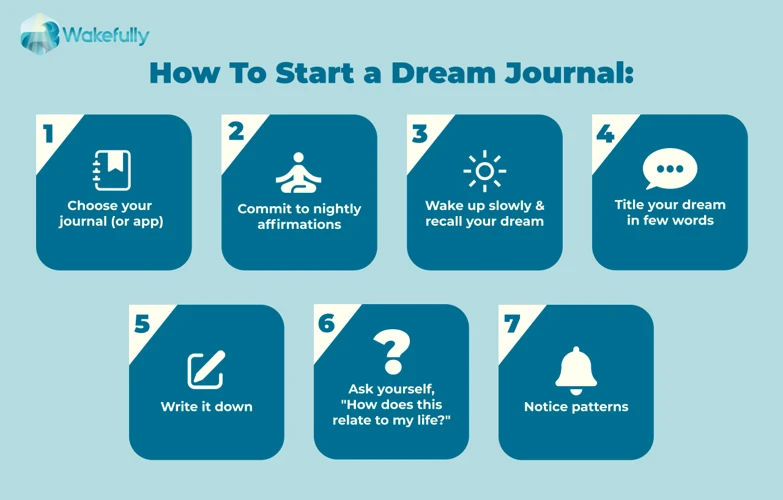Have you ever woken up from a dream feeling confused, scared, or even happy? Dreams can evoke a range of emotions that can leave us feeling perplexed about their meanings. However, with the help of dream journaling, we can better understand the role of emotions in our dreams and gain insights into our subconscious minds. In this guide, we will explore the science behind dreaming and emotions, why emotions matter in dream journaling, how to use emotions in dream journaling, as well as the benefits of an emotion-focused approach to dream journaling. So grab a notebook and pen, and let’s uncover the mysteries of the dreamscape together.
The Science Behind Dreaming and Emotions

As we close our eyes at night, we often embark on a fascinating journey through our dreams. However, dreams are not just figments of our imagination. They are actually a product of a highly complex and intricate process that occurs within our brain. The Science Behind Dreaming and Emotions is a subject that has intrigued scientists and researchers for centuries, and understanding this phenomenon can shed light on the way our emotions work. In this section, we will delve into the various stages of sleep and dreaming, as well as explore the emotional centers of the brain that play a crucial role in our dream experiences.
Stages of Sleep and Dreaming
During sleep, our brain goes through different stages of activity, each with its own characteristic brain waves and features. Understanding these different stages of sleep is crucial to understanding the relationship between emotions and dreams.
The stages of sleep are:
- Stage 1: This is the lightest stage of sleep and occurs when you first fall asleep. Your brain produces alpha and theta waves, and you may experience slow eye movements.
- Stage 2: This is a slightly deeper stage of sleep, characterized by the production of sleep spindles and K-complexes. These waves help to keep you asleep and prevent you from being easily woken up.
- Stage 3: Also known as deep sleep, this stage is marked by the production of delta waves. It’s the most restorative stage of sleep and is associated with physical healing processes.
- REM: Rapid eye movement (REM) sleep is the stage of sleep associated with dreaming. During this stage, your brain is highly active, and your muscles are essentially paralyzed to prevent you from acting out your dreams.
So how does this relate to emotions and dreaming?
Research has found that different stages of sleep are associated with different emotional processes. For example, deep sleep (stage 3) is associated with physical restoration and healing processes, while REM sleep is linked with emotional processing, memory consolidation, and creative problem-solving.
It’s during REM sleep that we tend to have the most vivid and emotional dreams. The emotional brain is highly active during this stage, and memories and emotions from the day are processed and integrated into our long-term memory.
By understanding the different stages of sleep and their connections to emotional processing, we can start to see how dreams can reveal our emotional state and provide insight into our subconscious thoughts and feelings.
The Emotional Brain
The brain is a vital organ that affects almost every aspect of our lives. It is also the center of our emotions. Our emotions are processed and regulated by a complex network of brain structures and circuits collectively known as the emotional brain.
The emotional brain consists of several components, all responsible for different aspects of emotional processing. These components include the amygdala, the hypothalamus, the hippocampus, and the prefrontal cortex.
The amygdala is responsible for processing and regulating emotions, especially fear and aggression. It plays a crucial role in detecting and responding to potential threats in our environment. When we experience something that triggers fear or anxiety, the amygdala sends signals to other parts of the brain to initiate the body’s fight or flight response.
The hypothalamus serves as a link between the nervous system and the endocrine system, which regulates hormones that affect mood and emotions. It also plays a role in regulating appetite, thirst, and body temperature.
The hippocampus is responsible for forming and storing memories, including emotional memories. It helps us to recall past experiences, both positive and negative, and forms the context for current emotional experiences.
The prefrontal cortex is known as the “thinking center” of the brain, responsible for making decisions based on rational thought and weighing consequences. It is also involved in regulating emotions and social behavior.
Together, these brain structures work to provide us with a complex and nuanced understanding of our emotions. The emotional brain plays a crucial role in influencing our experiences and shaping our responses to the world around us. Understanding how these structures work together can help us recognize the complex interplay of emotions in our dreams and how they relate to our waking life.
Why Emotions Matter in Dream Journaling

When it comes to dream journaling, many people focus solely on recounting the events of their dreams. However, what often goes overlooked is the crucial role that emotions play in our dreams. Emotions can provide valuable insight into our subconscious mind and help us better understand ourselves. In this section, we will explore why emotions matter in dream journaling and how they can be used to enhance the introspective nature of this practice.
How Emotions Affect Dreams
Emotions play a crucial role in shaping our dreams. Studies have shown that emotional experiences we have during the day can influence the content of our dreams at night. Dreams are thought to be a reflection of our emotional state, with emotions acting as a lens through which we see and interpret the events of our dreams. Here are some ways in which emotions can affect our dreams:
- Intensity: The intensity of emotions we experience during the day can influence the intensity of emotions we experience in our dreams. For instance, if we have a particularly stressful day, we may be more likely to have intense, anxiety-filled dreams at night.
- Themes: Emotions can also influence the themes that arise in our dreams. For example, if we are feeling insecure or anxious in our waking life, we may have dreams that focus on feelings of vulnerability or fear.
- Repetition: Our emotions can also play a role in the recurring dreams we have. If we are struggling with a particular emotional issue in our waking life, we may have recurring dreams that mirror these struggles.
- Memories: Emotions can also impact our ability to remember our dreams. If we have an emotional connection to a particular dream, we may be more likely to remember it and the emotions we experienced during it.
By keeping an emotion-focused dream journal, we can start to see patterns and connections between our emotional experiences during the day and the content of our dreams at night. This can help us gain a better understanding of ourselves and our emotional landscape.
The Importance of Self-Reflection
Self-reflection is a crucial aspect of dream journaling. It involves taking time to analyze and interpret your dreams, especially in regards to your emotions. Here are a few reasons why self-reflection is important:
- Increased Self-Awareness: By reflecting on your dreams, you become more aware of your thoughts, feelings, and behaviors. This can help you understand yourself better and identify any patterns or issues that may need addressing.
- Better Decision Making: When you understand your own emotions and motivations, you can make more informed decisions about your life. This can lead to more positive outcomes and a greater sense of control over your own destiny.
- Improved Mental Health: Reflecting on your dreams can help you process complex emotions and experiences, which can be therapeutic. It can also help you identify any underlying issues that may be affecting your mental health.
To make the most of self-reflection in dream journaling, it’s important to approach it with an open mind and a willingness to explore your emotions. Don’t be afraid to ask yourself tough questions and consider your dreams from different perspectives. With practice, self-reflection can become a powerful tool for personal growth and self-discovery.
How to Use Emotions in Dream Journaling

Exploring your emotions through dream journaling can be a significant step towards developing a deeper understanding of yourself. By documenting your dreams and analyzing the emotional content within them, you can gain insights into your subconscious mind and improve your emotional intelligence. In this section, we’ll explore practical steps and techniques you can use to incorporate emotions into your dream journaling process. So, let’s dive into how to use emotions in dream journaling.
Creating a Dream Journal
When creating a dream journal, it’s important to keep a few key things in mind. Here are some steps to get you started:
- Choose a journal: Select a notebook or journal specifically for recording your dreams. This will help you keep track of all of your dreams in one place and make it easier to reflect on them later.
- Date your entries: Write the date of each dream at the top of your entry. This will help you remember when the dream occurred and track patterns over time.
- Write in detail: When recording your dreams, be as detailed as possible. Try to capture the emotions and sensations you experienced during the dream. The more detailed you are, the easier it will be to reflect on the dream later.
- Use visuals: If you’re a visual person, consider drawing or sketching images from your dreams. This can be a helpful way to remember certain details or symbols from the dream.
- Reflect on your dreams: After recording your dream, take some time to reflect on it. Consider the emotions and symbols present in the dream and how they relate to your waking life.
By following these steps and consistently recording your dreams, you’ll be able to use your dream journal as a valuable tool for gaining insight into your emotions and subconscious mind.
Emotion-Focused Techniques
When using emotion-focused techniques in dream journaling, it’s important to remember that the goal is not just to record what happened in the dream, but to explore and understand the emotions that were present. Here are some techniques to help you do just that:
- Free Writing: When you wake up, spend a few minutes writing freely about how you feel. Try not to think too much about it – just write whatever comes to mind. This can help you tap into any emotions that are lingering from the dream.
- Emotion Labeling: As you write about the dream, pay attention to the emotions that come up. Try to label them as specifically as possible – for example, instead of just saying “I felt sad,” you might say “I felt a deep sense of grief.” This can help you better understand the nuances of your emotional experience.
- Visual Representation: If you’re finding it difficult to put your emotions into words, try drawing or painting them instead. Don’t worry about making a perfect piece of art – just focus on getting the emotions out in a way that feels authentic to you.
- Emotion-Focused Questions: As you reflect on the dream, ask yourself questions that help you explore the emotional content. For example, “What was it about the dream that made me feel anxious?” or “What does this emotion remind me of in my waking life?”
- Body Sensations: Often, our emotions manifest physically in the body. As you reflect on the dream, pay attention to any bodily sensations that come up – for example, a tightness in the chest or a lump in the throat. These can be clues to the emotions you’re experiencing.
By using these techniques and others like them, you can deepen your understanding of the emotions present in your dreams. Remember, the more you understand your emotional experience in the dream world, the better equipped you’ll be to navigate your emotions in your waking life as well.
Dream Interpretation Tips
Interpreting dreams can be a complex and subjective process. It’s important to keep in mind that the meanings of dreams are unique to each individual and can have layers of symbolism. Here are some tips for interpreting the emotions in your dreams and using them to gain insight into your inner thoughts and feelings:
| Tip 1: | Focus on emotion- how did the dream make you feel? What emotions were present in the dream? |
| Tip 2: | Consider the context- what was happening in the dream? Was there anything that resembled a real-life situation? |
| Tip 3: | Look for symbolism- what objects or situations appeared in the dream? What could they represent in your life? |
| Tip 4: | Write down any personal associations- what do certain objects, people, or situations in the dream remind you of? |
| Tip 5: | Consider the setting- where did the dream take place? Was it a familiar or unfamiliar place? |
| Tip 6: | Think about any recurring symbols or themes- have you had similar dreams before? What commonalities do they share? |
| Tip 7: | Reflect on your current emotions and experiences- what might the dream be telling you about your current circumstances or emotional state? |
Remember, dream interpretation is a personal and subjective process. These tips can serve as a starting point for understanding the emotions in your dreams and how they relate to your waking life. Trust your instincts and use your dream journal as a tool for self-discovery and growth.
Benefits of Emotion-Focused Dream Journaling
Exploring your emotions through dream journaling can bring various benefits to your overall well-being. By recognizing and examining the emotions present in your dreams, you can develop a greater sense of self-awareness and emotional intelligence. In turn, this can lead to deeper introspection and understanding of yourself. In this section, we will delve into the advantages of emotion-focused dream journaling and how it can positively impact your life. So, let’s dive into the powerful benefits that await you when you focus on your emotions in your dream journal.
Improved Emotional Intelligence
A benefit of emotion-focused dream journaling is increased emotional intelligence, which is the ability to recognize and understand one’s own emotions, as well as the emotions of others. This skill is highly valued in personal and professional relationships, as individuals who possess it are better equipped to navigate social situations and communicate effectively.
Research has shown that individuals who engage in regular dream journaling tend to have higher levels of emotional intelligence compared to those who do not. This may be because dream journaling involves reflecting on one’s thoughts, feelings, and experiences, which can lead to greater self-awareness and understanding.
By paying attention to the emotions present in their dreams, individuals can learn to recognize and regulate their emotions more effectively in waking life. For example, if a dream consistently elicits feelings of anxiety, the dreamer can make an effort to identify the root of the anxiety and develop coping strategies.
Here is a table highlighting the ways in which emotion-focused dream journaling can improve emotional intelligence:
| Ways in which emotion-focused dream journaling can improve emotional intelligence |
|---|
| Helps individuals identify and understand their own emotions |
| Encourages self-reflection and introspection |
| Enhances empathy and understanding of others’ emotions |
| Facilitates the development of coping strategies for dealing with difficult emotions |
Incorporating emotions into dream journaling can be a powerful tool for improving emotional intelligence and developing greater self-awareness and understanding.
Enhanced Self-Awareness and Understanding
Dream journaling with a focus on emotions can greatly enhance self-awareness and understanding. By recording and reflecting on our dreams, we can gain insight into our deepest fears, desires, and motivations. Additionally, paying attention to the emotions present in our dreams can help us uncover patterns and tendencies that we may not have been aware of before.
One way to increase self-awareness through dream journaling is to review and analyze our dream entries to identify recurring themes or symbols. For example, if we frequently dream about being chased or avoiding something, it may be an indication of underlying feelings of anxiety or fear. By recognizing these patterns, we can take steps to address any underlying issues and work towards personal growth.
Understanding is also key in emotion-focused dream journaling. When we record our dreams in detail, including the emotions we experienced, we begin to see connections between our waking life and our unconscious mind. Dreams may bring up repressed memories or emotions, and by acknowledging and exploring them, we can gain valuable insight into our psyche.
Ultimately, the enhanced self-awareness and understanding that comes with emotion-focused dream journaling can lead to a greater sense of authenticity and self-acceptance. By acknowledging our innermost thoughts and feelings, we can strengthen our relationship with ourselves and lead a more fulfilled life.
| Benefits of Enhanced Self-Awareness and Understanding: |
|---|
| – Increased self-awareness |
| – Identification of recurring themes and symbols in dreams |
| – Recognition and exploration of repressed memories or emotions |
| – Greater sense of authenticity and self-acceptance |
Therapeutic Benefits
One of the most significant therapeutic benefits of emotion-focused dream journaling is the opportunity for introspection and self-reflection. This process can lead to increased self-awareness and understanding, and potentially even lead to personal growth and healing.
Through the practice of dream journaling, individuals can learn to recognize their emotions and identify patterns in their thoughts and behaviors. This awareness can provide valuable insights into the root causes of emotional distress or trauma.
Regularly journaling your dreams enables you to better understand and process past events, which can be especially beneficial for individuals who have experienced trauma, anxiety, depression, or other mental health conditions.
Numerous studies have indicated that regular dream journaling and interpretation can be an effective form of psychotherapy for individuals experiencing a range of mental health concerns. For example, a study published in the Journal of Traumatic Stress discovered that writing about disturbing events in a dream journal can help alleviate symptoms of post-traumatic stress disorder (PTSD). Additionally, another study found that dream journaling and interpretation can help reduce symptoms of anxiety and depression in individuals with these conditions.
Dream journaling has a wide variety of therapeutic benefits that promote emotional healing, self-reflection, and personal growth. While it may not be a replacement for professional therapy, it is a valuable tool that individuals can use to support their mental health and wellbeing.
| Therapeutic benefits of emotion-focused dream journaling |
|---|
| Increased self-awareness and understanding |
| Opportunity for introspection and self-reflection |
| Potential for personal growth and healing |
| Valuable insights into the root causes of emotional distress or trauma |
| Effective form of psychotherapy for individuals experiencing mental health concerns |
| Alleviates symptoms of post-traumatic stress disorder (PTSD) |
| Reduces symptoms of anxiety and depression |
Conclusion
In conclusion, using emotions in dream journaling can bring about a deeper understanding of oneself and improve emotional intelligence. By reflecting on the emotions present in dreams, individuals can gain insight into their subconscious thoughts and feelings. This can lead to a greater understanding and acceptance of oneself.
Furthermore, emotion-focused dream journaling can have therapeutic benefits. It can provide an outlet for individuals to process and cope with difficult emotions in a safe and constructive way. This practice has been utilized in various forms of therapy, such as dream analysis and art therapy.
Overall, the science behind dreaming and emotions shows that there is a strong connection between the two. Incorporating emotions into dream journaling can bring about numerous benefits, including improved self-awareness, better emotional regulation, and therapeutic benefits. It is a simple practice that anyone can start today and can lead to a deeper understanding of oneself. So why not start keeping a dream journal and tap into the power of emotions? The possibilities are endless.
Frequently Asked Questions
What is dream journaling?
Dream journaling is the practice of recording your dreams in a journal or notebook.
Why should I keep a dream journal?
Keeping a dream journal can help you gain insight into your subconscious mind, improve your memory, and potentially lead to personal growth.
What is the science behind dreaming?
Dreaming is still not fully understood, but it’s believed to be a way for the brain to process emotions and memories.
How do emotions affect dreaming?
Emotions can influence the content and intensity of dreams. For example, feelings of anxiety can lead to more vivid and disturbing dreams.
What is emotional intelligence?
Emotional intelligence refers to the ability to identify, understand, and manage one’s own emotions and the emotions of others.
What is self-reflection?
Self-reflection is the process of examining one’s own thoughts, feelings, and behaviors in order to gain insight and personal growth.
What is dream interpretation?
Dream interpretation is the process of assigning meaning to the content of a dream.
How can dream journaling improve emotional intelligence?
By recording and reflecting on their dreams, individuals can gain insight into their own emotions and thought processes, which can in turn improve their emotional intelligence.
What are some emotion-focused dream journaling techniques?
Some techniques include focusing on specific emotions present in a dream, using imagery to enhance emotional understanding, and examining recurring emotional themes in dreams.
Can dream journaling have therapeutic benefits?
Yes, dream journaling can be a form of therapy that can help individuals process emotions and work through psychological issues.








